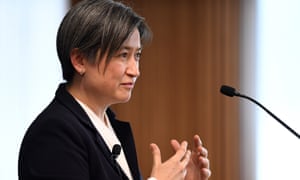Extract from The Guardian
The shadow foreign affairs minister, Penny Wong,
has urged Malcolm Turnbull to be more assertive with the Trump
administration on differences over climate and trade, saying doing so is
in Australia’s “national interest”.
Wong was speaking in the wake of the G20 conference in Hamburg, which exposed deep divisions between the US and other world leaders, particularly on free trade and the Paris climate change accord.
Several leaders made pointed comments about their disappointment with the US’s position on climate, including the German chancellor, Angela Merkel, and the French president, Emmanuel Macron.
Wong criticised Turnbull for what she described as his inability to raise issues of difference with Donald Trump.
“Australia’s national interest does require us to engage with the US assertively, energetically,” Wong told the ABC’s Insiders program on Sunday. “Where there are issues, we ought be clear about them and Malcolm Turnbull’s problem is that he hasn’t known whether to glide over difference, be upfront, or say anything.
“He hasn’t asserted himself clearly in how he wants to deal with the Trump administration.”
Turnbull is currently in Paris, having met with Macron, who was upfront in his criticism of US protectionism during the Hamburg conference.
North Korea’s latest test of an intercontinental ballistic missile – which raised fears the rogue state could target northern parts of Australia – dominated parts of the G20 summit.
The former prime minister Kevin Rudd this weekend called for Australia to consider a missile defence system to deter the threat, a reversal of the 2009 defence white paper’s position that such an approach would be “at odds with the maintenance of global nuclear deterrence”.
Wong said Labor had sought a briefing on the issue but urged calm when discussing the substance of the North Korean threat.
“I think it is a time we ought be responsible and sober about the language we use,” Wong said. “There is an escalation of the global threat. We need to deal with that sensibly.”
Wong was also pressed on federal Labor’s position on Palestine. A motion before the NSW branch has urged the next Labor government to “recognise Palestine”.
The motion, due to be voted on at the state conference late this month, would continue a shift to a more pro-Palestinian stance within Labor.
But Wong again insisted federal Labor’s position would not be determined by the state branch.
“New South Wales members are entitled to debate that motion but, ultimately, it is not binding on the federal party,” she said.
She said she remained committed to a two-state solution and said Labor’s policies must be geared toward that aim.
Wong repeated her condemnation of continued Israeli settlement construction as a “roadblock to peace and a roadblock to the two-state solution”.
Wong was speaking in the wake of the G20 conference in Hamburg, which exposed deep divisions between the US and other world leaders, particularly on free trade and the Paris climate change accord.
Several leaders made pointed comments about their disappointment with the US’s position on climate, including the German chancellor, Angela Merkel, and the French president, Emmanuel Macron.
Wong criticised Turnbull for what she described as his inability to raise issues of difference with Donald Trump.
“Australia’s national interest does require us to engage with the US assertively, energetically,” Wong told the ABC’s Insiders program on Sunday. “Where there are issues, we ought be clear about them and Malcolm Turnbull’s problem is that he hasn’t known whether to glide over difference, be upfront, or say anything.
Turnbull is currently in Paris, having met with Macron, who was upfront in his criticism of US protectionism during the Hamburg conference.
North Korea’s latest test of an intercontinental ballistic missile – which raised fears the rogue state could target northern parts of Australia – dominated parts of the G20 summit.
The former prime minister Kevin Rudd this weekend called for Australia to consider a missile defence system to deter the threat, a reversal of the 2009 defence white paper’s position that such an approach would be “at odds with the maintenance of global nuclear deterrence”.
Wong said Labor had sought a briefing on the issue but urged calm when discussing the substance of the North Korean threat.
“I think it is a time we ought be responsible and sober about the language we use,” Wong said. “There is an escalation of the global threat. We need to deal with that sensibly.”
Wong was also pressed on federal Labor’s position on Palestine. A motion before the NSW branch has urged the next Labor government to “recognise Palestine”.
The motion, due to be voted on at the state conference late this month, would continue a shift to a more pro-Palestinian stance within Labor.
But Wong again insisted federal Labor’s position would not be determined by the state branch.
“New South Wales members are entitled to debate that motion but, ultimately, it is not binding on the federal party,” she said.
She said she remained committed to a two-state solution and said Labor’s policies must be geared toward that aim.
Wong repeated her condemnation of continued Israeli settlement construction as a “roadblock to peace and a roadblock to the two-state solution”.

No comments:
Post a Comment